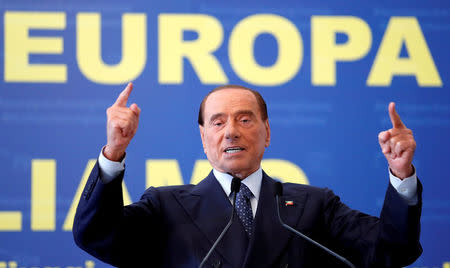Italy's centre-right in search of a leader as election nears
By Crispian Balmer ROME (Reuters) - Former Prime Minister Silvio Berlusconi returned to frontline Italian politics at the weekend, staking his claim to lead a resurgent centre-right into national elections that are expected early next year. At exactly the same moment, Berlusconi's outspoken ally, Matteo Salvini, was addressing his Northern League party and laying down his own marker to become the next prime minister. "Salvini Premier" read a sign stuck to the lectern. In reality, neither man looks likely to head the next government if they pull off an election victory, and possible alternative candidates are already emerging. "There is an apparent power struggle going on between Berlusconi and Salvini, but it will not get out of hand. They know a violent clash would be suicidal with voters," said Piero Ignazi, politics professor at Bologna University. "The truth is both men will remain head of their respective parties, but they won't be the next prime minister," he said. This would open the way for a consensus candidate who would have to bridge the huge divergences between the three main rightist parties -- from the fierce anti-EU agenda put forward by both the Northern League and Brothers of Italy to the pro-European vision embraced by Berlusconi on Sunday. Latest opinion polls show this trio of long-standing allies are pulling ahead in the polls and predicted to win a combined 35 percent of the vote, with the anti-migrant Northern League just ahead of Berlusconi' Forza Italia on some 15 percent. By contrast, the anti-establishment 5-Star Movement and ruling centre-left Democratic Party (PD) are seen on around 28 percent apiece. The 5-Star has ruled out any coalition alliances and the centre-left pool of votes is shrinking as various leftist parties engage in ferocious infighting. COURT APPEAL Under the current electoral system no party or bloc looks like winning enough seats to govern alone. However, political analysts say the wind is filling the centre-right's sails after years of adverse conditions, giving it pre-election momentum. Berlusconi ignominiously resigned from power in 2011 during a sovereign debt crisis. Mired in sex scandals and legal woes, he was subsequently expelled from the Senate and banned from running for office due to a 2013 tax fraud conviction. Open heart surgery last year left most analysts writing his political obituary. But not for the first time, the media tycoon, now 81, bounced back and has appealed to the European Court of Human Rights to overturn the ban on seeking election. A hearing is scheduled for November, but a verdict is unlikely to come for several months, meaning he almost certainly will not be able to stand in the next national ballot, which is due by May 2018 and widely expected to be held in March. "Despite his age, Berlusconi would love to be prime minister again. It would be his last hurrah. But realistically speaking, it is not about to happen," said a Forza Italia official, who declined to be named because of the sensitivity of the issue. Significantly, Berlusconi made his political comeback speech at an event organised by Forza Italia stalwart Antonio Tajani, the president of the European Parliament. Party sources said Tajani was in pole position to be Berlusconi's surrogate. COMPROMISE While Berlusconi's name abroad evokes memories of "bunga bunga" sex parties and wisecracks, Tajani is a much less colourful character, whose pro-European instincts would make him a reassuring figure for international markets. Those very same instincts would pose a problem for Berlusconi's hardline allies, who have regularly denounced the European Union and have called for Italy to quit the euro. "The leader of the centre-right needs to be chosen through a clear process, perhaps a primary," Giorgia Meloni, the head of Brothers of Italy, told Sky Italia television on Sunday. "I imagine that whatever grassroots method you decide, Tajani will not win out," she said. Brothers of Italy is a small, nationalist party, which is anti-migrant and anti-euro. It tries to differentiate itself from the League by saying it focuses on the whole country, not just the wealthy north. Buoyed by the League's strong poll numbers, Salvini says the leader of the party which wins the most votes next year should automatically be the prime ministerial candidate. But Berlusconi, a four-times premier, has ruled out handing over the baton of power to Salvini, who has embraced Europe's far-right and endorsed France's National Front. "We created the centre-right in Italy and we have always been its leader, laying out and fulfilling its programme," Berlusconi said on Sunday. The two men have not spoken for months, saying they are in no hurry to discuss strategy. Political analysts have speculated that the pro-business Forza Italia might find it easier to create a government of national unity with former prime minister Matteo Renzi's PD party rather than the populist Northern League. Forza Italia loyalists reject this notion. "We ruled with the Northern League for years in national government and we are ruling with them now in the regions and it is going well," said Forza Italia lawmaker Deborah Bergamini. One such regional coalition is in Liguria, headed by Forza Italia's Giovanni Toti. He attended both the Forza Italia and Northern League rallies at the weekend and is due to take part in a Brothers of Italy meeting this weekend. "Toti has been carefully building bridges between the three parties and would be a natural choice to head any national coalition," Bologna University's Ignazi said. (Reporting by Crispian Balmer; Editing by Robin Pomeroy)

 Yahoo News
Yahoo News 

